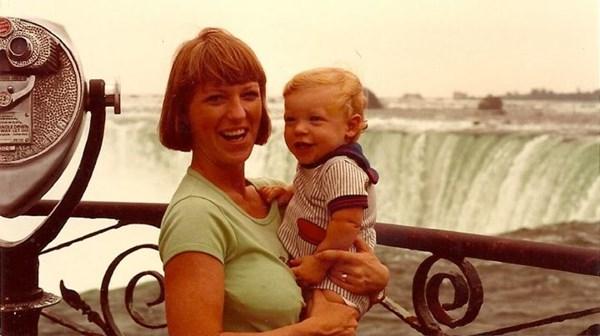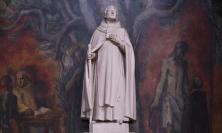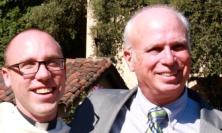It is easy to assume that being the mother of a priest must bring pride and privileges, but it presents a radical challenge, says Kristin Gilger, particularly to someone who has drifted away from the Church. Last week, Kristin’s husband, Gary, told us what it is like to be the father of someone who had chosen to enter Religious Life; for the Feast of the Annunciation, Kristin tells her side of the story.
Being the mother of a priest pretty much guarantees me a ticket to heaven and a comfortable lounge chair when I get there. At least that’s what I tell people. It’s a good way to get a laugh and overcome the awkwardness that usually ensues when someone learns what my son does for a living. There might even be an inkling of truth in it.
Dating back to the earliest days of the Church, it has been mothers who have received most of the credit when their sons have gone into the church business. I don’t know why this is the case or why fathers, including poor, inconspicuous Joseph, have been mostly ignored, but beginning with Mary it has been mothers whom the Church has singled out – and for once in a good way.
I’m sure many of these mothers prayed fervently for their sons to become priests, and if their prayers were answered, they earned special bragging rights: they had birthed and raised sons of God. They were officially good mothers, and they could look forward to even more rewards in heaven.
Fast-forward to 21st century America. I’ve met mothers – and fathers – who are thrilled their sons have become priests, but many are more than a little suspicious of the entire enterprise. This is due in no small part to the sexual abuse scandals of the past several decades, but it’s also because the priesthood is no longer a cushy career choice. In the hierarchy of jobs, it ranks somewhere alongside teachers’ aides and soldiers – occupations characterised by high stress and low pay.
Like me, these parents wonder if their children have made the right decision and if they really understand what they’re giving up. They worry about loneliness and what kind of career their children will have if Religious Life turns out not to suit them. And, like me, they fret over the loss of grandchildren.
When my son, Patrick, first told us he was considering becoming a Jesuit, I chalked it up to age (he was 20) and idealism (he was 20). I thought it was a romantic notion that would pass soon enough if I just nodded my head and said what good parents are supposed to say, namely, ‘I support you no matter what you decide to do.’
I did my best to be patient. What other option did I have unless I wanted to be like the mother of Saint Thomas Aquinas, who has gone down in history as the woman who locked her son in a tower to prevent him from becoming a Dominican priest? With no tower available, I relied on time. I thought perhaps this whole religious thing was something Patrick just needed to get out of his system. It would be like a love affair that he would look back on with a certain amount of nostalgia but little real regret.
That’s not what happened. Patrick entered the Jesuits at the age of 21, right after graduating from college. Ten years and ten months later, he was ordained in a ceremony replete with incense and chants and young men lying prostrate on the floor. There were songs sung in English and Latin, incense, psalms and more incantations; and it seemed to me that every movement, every word, was pitch-perfect, the result of centuries and centuries of practice.
Patrick could not have been happier. And I was happy for him, although that did not mean I had entirely reconciled myself to his vocation or to the institution of the Catholic Church.
I was raised Catholic, as was my husband. We came from observant families that went to church every Sunday, fasted on Fridays and occasionally prayed the rosary. When we married it was in the Catholic Church, and when we had children, they were baptised in the Church.
It was after Patrick’s First Communion that we decided to leave. We felt strongly that our children needed a spiritual foundation, but I was no longer comfortable with the Church’s teachings on issues like birth control. I was tired of feeling as if I, as a woman, wasn’t valued. It seemed to me that I could be a feminist or I could be a Catholic, but I could no longer be both.
We joined an Episcopalian Church, which felt familiar in its rituals but more accepting in its teachings. These Episcopalians embraced birth control, married clergy and female priests. They welcomed gay members, valued a decent choir and said as little as possible about abortion. Our children went to church and Sunday school classes, sang in the choir and competed to be angels in the Christmas pageants. Patrick attended confirmation classes and at the age of 12 became an official member of the Episcopal Church.
We had put the Catholic Church behind us for good. Or so I thought.
It was while attending a Jesuit college that Patrick rediscovered Catholicism. He was drawn at first, I think, to the mysticism and beauty of its rituals and the long pull of its history. And he had never really before considered that God could be so personal, so real in daily life. But I think he was mostly intrigued by the Jesuits he met, men who seemed so worldly and so other-worldly at the same time. They could probe philosophy one minute and dissect basketball scores the next. They were deeply religious but not in an in-your-face kind of way. And perhaps best of all for an idealistic young man, they were rebels and reformers: they wanted to change the world.
The risk, the radicalism of it all, appealed to him. These were not men who settled for comfortable lives in suburbia. They lived zealously, with conviction and purpose.
My son was equally impressed with the way people around him talked about God. His best friends in high school included evangelical Christians and Mormons who were good people and liked to discuss God but, ‘not in a way that was compelling or intellectually rigorous,’ he said.
These Jesuits were different. And Ignatius Loyola, a Spanish ex-soldier who read a book about saints and decided he could be one too, simply blew him away.
These were the sparks of his faith, but over the years they have grown into something much deeper and much more enduring. Patrick still wants to change the world, but he also wants to change himself and others. I think I can say with some certainty that he has done both.
While neither of my daughters were raised Catholic, they both now lay claim to the faith. They considered Catholicism because of their brother, but they remain Catholic because they believe.
My husband and I have been slower to return to the Church of our childhoods, but we, too, have been pulled back. I realised this recently when filling out a form that asked for my religion. ‘Catholic,’ I wrote, almost without thinking.
My son has not in any way insisted on this, but I can see how much it means to him that we are trying.
It was at my dad’s funeral that I saw for the first time what Patrick would be like as a priest. The pastor of my parents’ home parish happened to be a Jesuit and when he found out that Patrick also was in the Society he was happy to have some help.
Patrick was the one who led the rosary at the funeral home and encouraged people to share memories of my dad. And that night, as my sisters and brothers and their children and their children’s spouses crowded into my sister’s house to eat pasta, drink beer and talk, Patrick went down to the basement and, surrounded by a decade’s worth of discarded toys, wrote a farewell for all of us.
The sermon he delivered at the next day’s funeral Mass was a warm and funny reminder that my father was the kind of person who, no matter how irreverent, no matter how many bad priest jokes he told, always kept God (and the Chicago Cubs) close to his heart. At his best, Patrick said, John Grady was child-like but not childish, someone who loved fully and lived large.
After the Mass, after they wheeled my dad’s casket out of the church and out into a bitter cold January morning, we drove to the graveyard where Patrick sprinkled holy water on the casket and spoke the final, solemn prayers for the dead.
‘Patrick was wonderful,’ my sisters whispered to me as we left the cemetery. He was wonderful, I thought. He’s really good at this.
Like many Catholics of their generation, my parents had seen most of their children and grandchildren drift away from the Church. With one or two exceptions, we are no longer the kind of people who believe in the healing power of a cross. We don’t see the point of dragging ourselves to Mass on Sunday mornings. And while some of my siblings were married in the Catholic Church and had their children baptised, their children – my nieces and nephews – generally don’t bother with even that. The premarital classes take too much time; the churches are too hard to book.
But when we’re together, whether it’s for a wedding or a funeral or just a family gathering, they look to Patrick. Will he say grace before the meal? Can he talk to a troubled nephew or niece or daughter or son and see if he can’t straighten them out? Will he say a prayer for them?
I still worry about my son’s choice to be a Catholic priest. I see him with his sister’s baby and I mourn that he will never have his own. I see him exhaust himself on other people’s problems. I worry that he’ll end up lonely and alone in one of those retired priest homes where no one will visit – because who would come?
But I have also seen grace. I have seen the way Patrick and his brother Jesuits lift the people around them and give them hope and how they are lifted in return. I have experienced the favour of loved ones and witnessed the efforts of strangers who do things, who give love and mercy and unmerited favour, that would be inexplicable in a world without divine influence.
I still find it hard to be Catholic, but I have discovered it’s much easier to reject the Church when I can hold it at a distance. Close up, with my son at my side, the flaws are much harder to see.
Kristin Gilger is associate dean of the Walter Cronkite School of Journalism and Mass Communication at Arizona State University. She spent 20 years as a reporter and editor at various newspapers around the country before joining ASU, where she teaches in addition to administrative duties. She has recently completed a memoir about her experience growing up Catholic and how her son’s journey to priesthood has brought her family back to the Catholic Church. She and her husband, Gary, have three grown children, one grandchild (with another on the way) and live in Phoenix, Arizona.
Read Kristin's husband Gary's account of his reaction to Patrick's vocation.
Title taken from Luke 1:29.






